|
|
|
Sort Order |
|
|
|
Items / Page
|
|
|
|
|
|
|
| Srl | Item |
| 1 |
ID:
092039
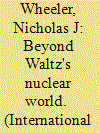

|
|
|
|
|
| Publication |
2009.
|
| Summary/Abstract |
In 1981 Kenneth Waltz published a controversial Adelphi Paper, 'The Spread of Nuclear Weapons: More May Be Better', in which he turned the conventional wisdom on its head by arguing that the spread of nuclear weapons would not be a terrifying prospect. This article rejects the proposition that fear of nuclear destruction can serve as a permanent basis of international order, and argues that securing order depends upon the building of trust between nuclear-armed and arming powers. A key contribution here has been the theory and practice of security communities, which opens up the promise of replacing nuclear threats by a new international politics in which force has been delegitimated as an instrument of state policy. This article discusses the potential for nuclear trust-building through the example of the security community that developed between Argentina and Brazil in the 1980s. Both countries had the potential to develop nuclear weapons by the end of the 1970s, and there were concerns that their rivalry might lead to a regional nuclear arms race. Having explored the factors that promoted trust between Buenos Aires and Brasilia, the article considers the lessons that can be learned for nuclear trust-building elsewhere.
|
|
|
|
|
|
|
|
|
|
|
|
|
|
|
|
| 2 |
ID:
037734


|
|
|
|
|
| Publication |
Oxford, Clarendon Press, 1989.
|
| Description |
263p.
|
| Standard Number |
0198275412
|
|
|
|
|
|
|
|
|
|
|
|
Copies: C:1/I:0,R:0,Q:0
Circulation
| Accession# | Call# | Current Location | Status | Policy | Location |
| 031455 | 355.033541/CLA 031455 | Main | On Shelf | General | |
|
|
|
|
| 3 |
ID:
095806


|
|
|
|
|
| Publication |
2010.
|
| Summary/Abstract |
The regime of nuclear non-proliferation depends on more than the cost-benefit calculation. Instead, trust plays a significant role in both maintaining relationships and underwriting shared values. Understanding how trust is built and strengthened is vital as the nuclear landscape changes.
|
|
|
|
|
|
|
|
|
|
|
|
|
|
|
|
| 4 |
ID:
167208
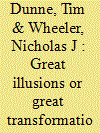

|
|
|
|
|
| Summary/Abstract |
Human rights have been in the practice of international relations, but they have not been central to academic thinking on International Relations (IR) for most of the century since the discipline became institutionalized in 1919. We suggest two related reasons for this relative neglect by the IR community. First, the US heartland of IR prioritized other institutions of international order during the 1950s and 1960s, primarily the balance of power, diplomacy, and arms control. Second, human rights were treated with suspicion by realists in particular given their view that morality in foreign policy was potentially disruptive of international order. If the emergent discipline of IR largely ignored the 1948 Universal Declaration of Human Rights, so did the rest of the world according to the revisionist history of human rights offered by Samuel Moyn. He challenges the idea that the birth of the regime was the culmination of a 150-year struggle that began in the minds of Enlightenment thinkers and ended with a new globalized framework of rights for all. While IR was slow to come to human rights, the pace in the last three decades has quickened considerably; the area of protecting the basic right of security from violence being a case in point, where several IR scholars have been pivotal in the development of action-guiding theory. Developing a critical theme in Carr’s The Twenty Years’ Crisis 1919-1939, we consider whether these institutional developments represent great illusions or great transformations in international relations in Carr’s terms.
|
|
|
|
|
|
|
|
|
|
|
|
|
|
|
|
| 5 |
ID:
101077
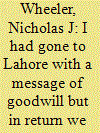

|
|
|
|
|
| Publication |
2010.
|
| Summary/Abstract |
This article explores how it became possible for the former Indian Prime Minister, Atal Behari Vajpayee, to make a major trust-building initiative with his Pakistani counterpart, Nawaz Sharif, at the 1999 Lahore Summit. Building on security dilemma theorizing in the field of International Relations, the present article develops the concept of a "leap of trust" as a way of understanding how decision-makers trapped in security dilemmas might break through the psychology of distrust by a frame-breaking conciliatory move. This framework is then applied to the moves that led to the development of a trusting relationship between Sharif and Vajpayee. A few months later, Pakistan launched an attack across the Line of Control (LoC) and Vajpayee felt betrayed. I explore how far Sharif knew about his army's plans to attack at Kargil and ask whether he was prisoner of a Pakistani military machine that was intent on pursuing a military solution in Kashmir irrespective of any peace process that might be developing. The article examines the lessons that Vajpayee drew from Kargil and discusses his two further attempts to recover the trust that had developed at Lahore. I conclude with an analysis of the wider lessons of this case for the success of any future leaps of trust that Indian and Pakistani leaders might take.
|
|
|
|
|
|
|
|
|
|
|
|
|
|
|
|
| 6 |
ID:
119456
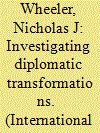

|
|
|
|
|
| Publication |
2013.
|
| Summary/Abstract |
This article investigates the role that diplomacy - especially at the highest levels - can play in transforming adversarial relationships. Building on Martin Wight's exploration of these issues, in particular the question of how two adversaries can convince each other that they are serious negotiating partners, the article contends that achieving a significant de-escalation of a conflict depends upon the growth of trust.
In contrast to Wight's limited conception of what diplomacy could achieve in terms of ending conflicts, the argument made here is that particular types of communicative encounters between diplomats, and especially leaders, can build a level of trust at the interpersonal level which can lead policy-makers to make conciliatory frame-breaking moves. To make good on this claim, the article employs a case-study of the summitry between US president Ronald Reagan and his Soviet counterpart, Mikhail Gorbachev.
The key contention here is that the face-to-face encounters between Reagan and Gorbachev promoted a level of trust between them that made possible the fundamental de-escalation of the Cold War that took place in the second half of the 1980s. Rival explanations focusing on nuclear weapons and Soviet economic decline are analysed, but while these were enabling conditions in the transformation of relations, the article argues that it is necessary to recognize the critical role that interpersonal trust between US and Soviet leaders played in achieving this diplomatic transformation.
|
|
|
|
|
|
|
|
|
|
|
|
|
|
|
|
| 7 |
ID:
176036


|
|
|
|
|
| Summary/Abstract |
This article reflects on Nicholas J. Rengger’s 1997 article in International Affairs on ‘The ethics of trust in world politics’. The article has received comparably little attention, which is a shame because as I explore in my contribution it remains two decades on a highly important intervention in the on-going debate over the possibilities for developing and sustaining trust in an anarchic international system. Rengger argued that international cooperation, and the idea of international society it rests on, cannot be sustained in the absence of what he called ‘a presumption of trust’. However, he viewed this presumption in late modernity as an increasingly fragile one, and whilst he offered some ways to shore up the crumbling foundation of trust, his moral skepticism as to the possibilities of realising this run through his thinking. Rengger’s concern was that as the practices that ‘ground’ trust erode, cooperation will come to depend solely on rational egoist, interest-based calculations, and that such a basis is unstable and prone to breakdown. The problem that Rengger identified of how to ground authoritative practices of trust in international society remains an urgent one at a time when great power relations are characterised by increasing distrust. Having engaged with some of his key arguments in the article, I end by briefly identifying three problems that his essay would have benefited from considering further. These are (1) the relationship between trust and trustworthiness; (2) the neglect of security community theory; and (3) the potential of ‘godparenting’ (a concept Rengger borrows and develops from the moral philosopher Annette Baier) in international relations.
|
|
|
|
|
|
|
|
|
|
|
|
|
|
|
|
| 8 |
ID:
127123
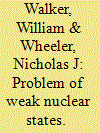

|
|
|
|
|
| Publication |
2013.
|
| Summary/Abstract |
Governments are increasingly recognizing the problem posed by internally weak nuclear-capable states. The problem, however, is under-theorized. This article brings together literature on sovereignty and international order, the nonproliferation regime, and weak states, and introduces new concepts to provide a more structured understanding of this problem. Insight comes from focusing attention on the function and governance of two nuclear estates (termed the production and operational estates), and on their resilience to decay and disorder occurring within the state and society. Drawing on empirical observation, the authors suggest a typology of weakness in nuclear states, involving state fragmentation typified by the former Soviet Union, the "hard weak state" typified by North Korea, and the internally conflicted state typified by Pakistan. Although these types give rise to distinctive difficulties, their alleviation depends heavily on the maintenance of internal authority within the state and estates, the presence or absence of cooperative relations, and the international regulatory framework's vitality.
|
|
|
|
|
|
|
|
|
|
|
|
|
|
|
|
| 9 |
ID:
095114


|
|
|
|
|
| Publication |
2010.
|
| Summary/Abstract |
A successful outcome of the 2010 Nuclear Non-Proliferation Treaty (NPT) Review Conference is widely seen as vital if the NPT is to continue to play an important role in preventing nuclear proliferation. Focusing on the concept of trust, this article offers a novel perspective on the treaty and its future prospects. Too often dismissed as impossible or dangerous in international politics, trust has received little attention from both academics and practitioners. This article challenges this predominant view by making a case that the NPT establishes and embodies a series of trusting relationships between states. Trusting relationships are analysed as a way in which states relate to each other, taking into account both interests as well as promises. It does not make the case that once such relationships are established they will remain constant, but rather that trusting relationships are dynamic. They can be strengthened or weakened depending on the choices of actors. The article shows how trusting relationships have underpinned the NPT from its beginning and charts their evolution by reference to three key sets of relationships. These are, first, the relationships between the recognized nuclear weapon powers and the non-nuclear weapon states; second, those among the recognized nuclear weapon states; and third, those between the NPT signatories and those states remaining outside of the treaty. For each set of relationships the problems and issues that have eroded trust are outlined and the steps that might lead to the overcoming of these strains and the strengthening of the trusting relationships are discussed. By understanding the NPT through the prism of trust, the article sheds new light on both the achievements of the treaty as well as its potential fragility. At the same time, such an analysis opens up the directions of policy crucial to strengthening the treaty at the Review Conference and beyond.
|
|
|
|
|
|
|
|
|
|
|
|
|
|
|
|
| 10 |
ID:
047170


|
|
|
|
|
| Publication |
Oxford, Oxford University Press, 2000.
|
| Description |
xv, 336p.
|
| Standard Number |
0198296215
|
|
|
|
|
|
|
|
|
|
|
|
Copies: C:1/I:0,R:0,Q:0
Circulation
| Accession# | Call# | Current Location | Status | Policy | Location |
| 044947 | 341.584/WHE 044947 | Main | On Shelf | General | |
|
|
|
|
| 11 |
ID:
077885


|
|
|
|
|
| Publication |
2007.
|
| Summary/Abstract |
The United Nations Security Council (UNSC) is at the heart of the world's collective security system. It is upon this body that rests 'primary responsibility for the maintenance of international peace and security' (UN Charter, Article 24). In this article, we examine the current debate regarding the legitimacy crisis facing the UNSC. We consider its most usual manifestation, namely that the Council faces a crisis of legitimacy because of its inability to constrain the unilaterally inclined hegemonic United States. But we also examine the converse argument that it is the whole UN collective security mechanism (rather than just the Council) that is in crisis. According to this, it is the failure to recognize the unique dangers immanent within the contemporary security environment and the inability of the UN security system to tackle these which is the cause of the current crisis of legitimacy. International society, this position continues, must acknowledge these, and vest in the hegemon the powers it requires in order to meet its global responsibilities. Acknowledging the implications of both of these positions, we argue that the resolution of the current crisis of legitimacy is to be achieved through a more expansive interpretation of the Security Council's extant powers, accompanied by a commitment on the part of the United States to reinvest in the multilateral machinery upon which global order is founded
|
|
|
|
|
|
|
|
|
|
|
|
|
|
|
|
| 12 |
ID:
085424


|
|
|
|
|
| Publication |
2008.
|
| Summary/Abstract |
It is well known in the literature on security dilemma theorising that John Herz coined the concept in the early 1950s, with Herbert Butterfield developing a very similar concept at the same time. What is less well appreciated is that Butterfield powerfully argued in his 1951 book History and Human Relations that there was no prospect of state leaders and diplomats overcoming the dynamics of mutual suspicion and distrust that created what he had chosen to call a condition of `Hobbesian fear'.
|
|
|
|
|
|
|
|
|
|
|
|
|
|
|
|
|
|
|
|
|